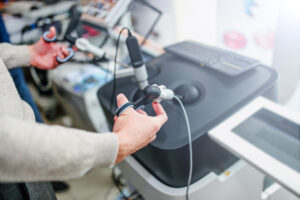Medical Innovation: Implications for Healthcare Staffing

The medical industry has been experiencing a technological renaissance, with groundbreaking innovations reshaping the way medical services are delivered, diagnosis is conducted, and patient care is managed. At the same time, medical innovation presents implications for healthcare staffing, as it requires continuous education, training, and adaptation to ensure that medical professionals can leverage them effectively. To provide patients with the best possible care, institutions can partner with healthcare staffing agencies to connect them with the medical professionals capable of working effectively with the latest technologies.
Medical Innovation: What Are the Workforce Implications?
The promise of these advances is to enhance patient outcomes and quality of care through optimizing healthcare processes. Each example below comes with its own skillset needs and implications for medical workers.
Artificial Intelligence (AI) and Machine Learning
Artificial Intelligence and machine learning are revolutionizing the way medical data is analyzed, diagnoses are made, and treatment plans are personalized. AI algorithms can process vast amounts of patient data, medical literature, and clinical studies to provide insights for healthcare professionals, supporting their decision-making processes. A 2023 study published in Radiology found that AI outperformed traditional methods at predicting five-year breast cancer risk. While AI has the potential to improve diagnostic accuracy and efficiency, healthcare staff need training to collaborate effectively with AI systems and interpret results accurately.
Telemedicine and Virtual Care
Telemedicine and virtual care have experienced exponential growth, especially since the height of the COVID-19 pandemic, when in-person visits were limited to reduce the spread of the virus. A 2020 report by the American Medical Association (AMA) suggests that telemedicine might lead to a shift in job roles, with a greater emphasis on virtual patient consultations and remote patient monitoring.

Robotics and Robotic-Assisted Surgery
Robotic technology is transforming surgical procedures. Robotic-assisted surgeries have been associated with shorter hospital stays and quicker patient recovery times. Surgeons and surgical teams must receive specific training to operate and collaborate with robotic systems effectively. This is the type of highly specialized physician skillset that healthcare staffing agencies are uniquely situated to place. In addition, robotics might lead to changes in job roles, with some tasks being delegated to robotic systems freeing up certain healthcare professionals to focus more on patient care, patient education, and recovery.
The Internet of Medical Things and Remote Patient Monitoring
The Internet of Medical Things (IoMT) includes smartwatches, fitness trackers, blood pressure monitors, and glucose meters – interconnected medical devices and wearables that collect and transmit patient data in real-time. Healthcare professionals need to learn to interpret data generated by IoMT devices and integrate it into patient care plans effectively. Moreover, the increased use of remote patient monitoring may require additional staff to manage and analyze the influx of patient data.
What Tech-Related Staffing Implications Should Healthcare Institutions Prepare for?
The latest medical innovations offer numerous benefits to both patients and medical professionals. Each comes with staffing implications medical institutions should consider as they continue adopting these innovations.
-
Training and Education
As new technologies are integrated into healthcare settings, healthcare professionals need adequate training and education to effectively use and collaborate with these systems. Continuous professional development is crucial to ensure that staff members are current with the latest advancements and can provide optimal care to patients.
-
Job Role Transformation
With the introduction of AI, robotics, and telemedicine, some job roles may undergo transformation or evolve into new specialties. In anticipation of these changes, healthcare institutions should plan for workforce restructuring, retraining, and redeployment as necessary.

-
Emphasis on Soft Skills
While technology plays a pivotal role in healthcare, the human element remains essential. Healthcare professionals should emphasize the development of soft skills, such as empathy, communication, and patient-centered care, to complement the capabilities of technology and enhance patient experience.
-
Data Management and Privacy
The increased use of technology generates vast amounts of patient data, necessitating robust data management systems and stringent measures to ensure patient privacy and compliance with regulatory requirements.
The Future is Now
The latest healthcare technologies are driving a paradigm shift in the healthcare industry, providing innovative solutions to longstanding challenges and holding great promise for improving healthcare outcomes, patient experiences, and operational efficiencies for healthcare providers.
As these technologies continue to mature, it is essential for healthcare organizations and policymakers to embrace them responsibly and integrate them seamlessly into their existing systems. Healthcare staffing agencies can provide a valuable service matching trained medical professionals with the technology needs of the organization. By proactively addressing these staffing implications, the healthcare industry can successfully navigate the integration of medical innovation and foster a harmonious partnership between healthcare staff and cutting-edge innovations.